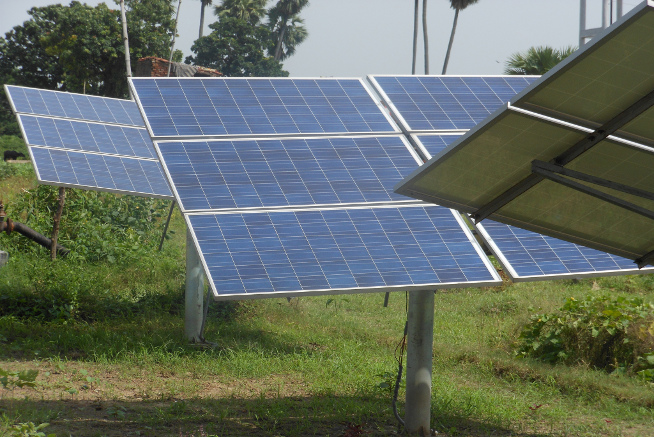Consulting firm Bridge to India has said that the Indian government’s decision to place solar cells and modules in the higher 18% Goods and Services Tax (GST) slab could increase solar project costs by around 12% on average and harm the progress of around 10 GW of utility-scale projects currently at various stages of construction.
The analysts did, however, stress that in the long run the higher tax slab for solar cells and modules would have little negative impact on India’s solar ambitions, which amount to a 100 GW installation target by 2022.
In the short-term, though, the government’s decision to leave coal in the lower 5% tax slab while hitting solar the hardest has left some industry observers puzzled, the Bridge to India report said.
“A commercially viable, non-subsidy dependent sector is naturally more sustainable in the long run,” stated the report in a nod to Energy Minister Piyush Goyal’s remarks that he would like to see solar stand “on its own two feet”. “However,” Bridge to India went on, “we do wonder why solar equipment is attracting higher taxes than coal or other power equipment.”
Prior to the government’s tax hike, solar cells and modules paid essentially zero GST, given that these components were eligible for rebates and tax breaks in the form of import duty waivers and 0% VAT.
Now, however, Bridge to India calculates that module costs will be 18% higher – as a direct result of the GST – inverter costs will increase by 12%, and service costs 3%. “Overall project costs will likely rise by about 12%,” said Bridge to India. “New rates would hit more than 10 GW of ongoing utility-scale projects and pose a threat to their viability.”
Domestic module manufacturers, for so long looking towards government for a leg up in this increasingly competitive solar market, will receive no extra protection as the cost of import of raw material – such as solar cells and wafers – is also set to increase by 18%.
Within India’s solar industry there had been an expectation that solar modules would be held under the 0% GST rate, or at worst placed in the 5% bracket as the government continued to support the sector’s growth. Bridge to India has said that by placing the burden of cost directly on to solar developers, the process of building solar plants will become more complex and challenging, and could lead to cancelations.
Some developers were less optimistic than Bridge to India in their assessment of the GST hike’s likely impact on the Indian solar market. Ratul Puri, chairman of Hindustan Power Projects, told The Economic Times that the cost of generation could increase by 20%. “It will require project developers to go back to banks for additional funding for projects under construction,” said Puri. “IT might require a minimum of three months to get additional funding, thus delaying projects.”
Hero Future Energies CEO Sunil Jain said that he estimates project prices to rise by at least 16% because electricity has been excluded from the GST and is thus ineligible for input tax credit.
This content is protected by copyright and may not be reused. If you want to cooperate with us and would like to reuse some of our content, please contact: editors@pv-magazine.com.



1 comment
By submitting this form you agree to pv magazine using your data for the purposes of publishing your comment.
Your personal data will only be disclosed or otherwise transmitted to third parties for the purposes of spam filtering or if this is necessary for technical maintenance of the website. Any other transfer to third parties will not take place unless this is justified on the basis of applicable data protection regulations or if pv magazine is legally obliged to do so.
You may revoke this consent at any time with effect for the future, in which case your personal data will be deleted immediately. Otherwise, your data will be deleted if pv magazine has processed your request or the purpose of data storage is fulfilled.
Further information on data privacy can be found in our Data Protection Policy.